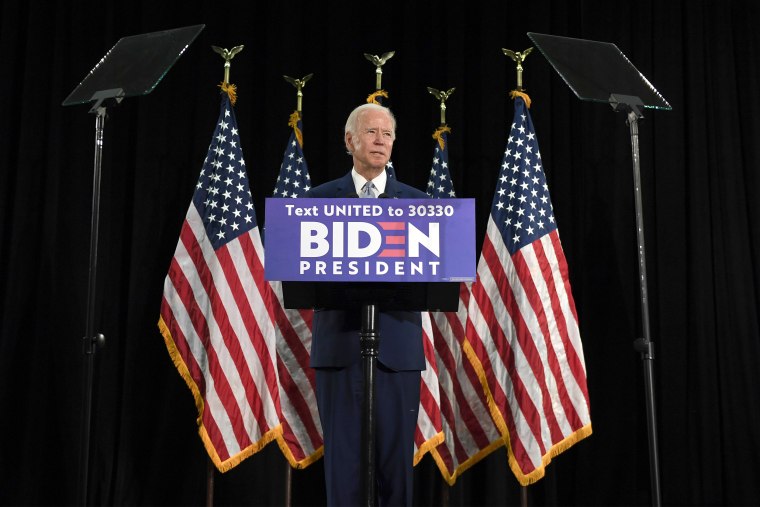Joe Biden on Monday announced the formation of his presidential campaign’s LGBTQ steering committee, Out for Biden, an initiative “aimed at turning out a record number of LGBTQ+ voters this November to elect Joe Biden.”
The announcement comes days after the former vice president formally clinched the Democratic nomination for president by securing more than 2,000 of the total 3,979 pledged delegates.
The committee has over 30 members, including most of Congress’ LGBTQ delegation: Sen. Tammy Baldwin, D-Wis., and Reps. David Cicilline, D-R.I., Angie Craig, D-Minn., Sharice Davids, D-Kan., Sean Patrick Maloney, D-N.Y., Chris Pappas, D-N.H., and Mark Takano, D-Calif., are all members.
The campaign also launched a new LGBTQ website section with links to Biden’s full LGBTQ policy platform.
"Our campaign’s decision to launch Out for Biden in the shadow of historic protest elevates the power of the moment and encourages deep — and sometimes difficult — dialogue within our LGBTQ+ community as Pride month begins,” Reggie Greer, the Biden campaign’s LGBTQ+ Vote Director, said in a press release.
“LGBTQ+ people of color are central to the fabric of our communities,” Greer added. “We must elect a government that will center their voices and celebrate the contributions of LGBTQ+ people everywhere."
There is significant electoral college potential for Biden in LGBTQ voters: There are an estimated 11 million lesbian, gay, bisexual and transgender eligible voters dispersed throughout the country, and 9 million of them are registered to vote — disproportionately as Democrats — according to an estimate from the Williams Institute at the UCLA School of Law.
In the 2016 election, Hillary Clinton won the national popular vote by millions but lost the electoral college due, in part, to slim defeats in Wisconsin, Michigan and Pennsylvania that totaled fewer than 80,000 votes combined. According to state-level estimates by the Movement Advancement Project, Wisconsin has 171,000 LGBTQ adults, Michigan has 311,000 and Pennsylvania has 416,000 — all easily outstripping Clinton’s 2016 electoral college loss margins.
The Biden campaign said the Out for Biden committee members were chosen, in part, based on states the campaign hopes to contest in November’s election, providing a faint outline of the campaign’s view of the 2020 map: Members include those from Ohio, Wisconsin, North Carolina, Kansas, Virginia, Arizona, Colorado, Minnesota, Florida, Pennsylvania, Michigan, Georgia and Nevada.
Alphonso David, a member of the committee and the executive director of the Human Rights Campaign, the country’s largest LGBTQ advocacy group, said data shows LGBTQ people are a “growing and crucial voting bloc in elections across the country.”
“Our rights have long been on the ballot, compelling us to register to vote and participate in politics rather than let others speak for us and make decisions without us,” he said in a statement.
While there are an estimated 11 million estimated LGBTQ voters across the U.S., David said his organization’s research has found there are 57 million “equality voters” in the country: voters who prioritize pro-LGBTQ stances when selecting political candidates.
During this year’s Democratic presidential primaries — where roughly 10 percent of the electorate in many state contests identified as lesbian, gay bisexual or transgender — LGBTQ voters disproportionately supported Sen. Bernie Sanders, I-Vt., according to the NBC News exit poll. However, LGBTQ people have long been a reliable voting bloc for Democrats, and David said these voters will strongly back Biden.
In the 2018 midterm elections, 82 percent of LGBTQ people voted for their Democratic candidate for Congress, while just 17 percent voted for the Republican candidate. And in the 2016 presidential election, 78 percent of LGBTQ voters picked Clinton, while 14 percent chose Donald Trump.




